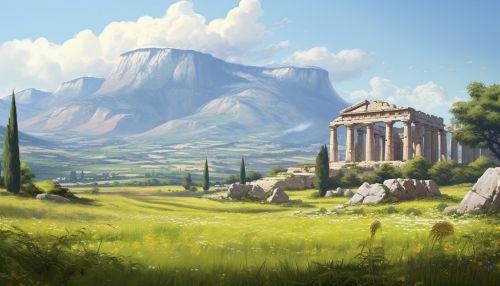Spartan society
Overview
The Spartan society was a unique socio-political structure that emerged in ancient Greece. It was characterized by its military discipline, communal lifestyle, and rigid social hierarchy. The Spartan society was divided into three main classes: the Spartiates, the Perioeci, and the Helots.
Origins
The origins of Spartan society can be traced back to the Dorian invasion of Greece around 1100 BC. The Dorians, a Greek tribe, established a military state in the region of Laconia, which later came to be known as Sparta. The Spartan society was heavily influenced by the Dorian culture, particularly their emphasis on military prowess and discipline.
Social Structure
Spartan society was divided into three main classes: the Spartiates, the Perioeci, and the Helots.
Spartiates
The Spartiates were the ruling class of Spartan society. They were full citizens and were the only ones allowed to vote and hold political office. The Spartiates were trained from childhood in the agoge, a rigorous education system that focused on physical fitness, military training, and discipline.
Perioeci
The Perioeci, or "dwellers around", were free non-citizens who lived in the surrounding areas of Sparta. They were primarily involved in trade and industry, as the Spartiates were forbidden from engaging in any form of manual labor or trade.
Helots
The Helots were the lowest class in Spartan society. They were essentially state-owned slaves who worked the land for the Spartiates. Despite their low status, the Helots were crucial to the Spartan economy, as they provided the food that sustained the entire society.
Military
The military was the backbone of Spartan society. From a young age, Spartan boys were trained to become soldiers in the agoge. The Spartan military was renowned for its discipline, tactics, and resilience, making it one of the most feared forces in ancient Greece.
Education
Education in Spartan society, known as the agoge, was focused on producing disciplined soldiers and obedient citizens. Boys were taken from their families at the age of seven and trained in a harsh and competitive environment. Girls were also educated, but their training was focused on preparing them to be mothers of future soldiers.
Economy
The economy of Spartan society was primarily based on agriculture, with the Helots working the land to provide food for the Spartiates and Perioeci. Trade and industry were also important, but these were the domain of the Perioeci, as the Spartiates were forbidden from engaging in these activities.
Religion
Religion played a significant role in Spartan society. The Spartans worshipped the same gods as other Greeks, but they also had their own unique religious practices and festivals.
Decline
The decline of Spartan society began in the 4th century BC, following their defeat by Thebes in the Battle of Leuctra. The loss marked the end of Spartan dominance in Greece and led to a gradual decline in their military and political power.
Legacy
Despite its decline, the legacy of Spartan society continues to be felt today. The term "spartan" has come to symbolize austerity, discipline, and courage in the face of adversity.
See Also


